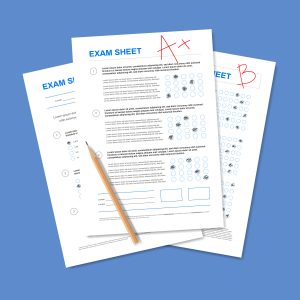
The written examinations for A-Levels are just commencing and stress is in the air. Students are most prone to suffer from burnouts at this crucial stage, posing a high risk of a mental collapse, rendering their years of preparation wasted.
‘Burnout’ is a term that is widely feared by students, parents, teachers, and tutors.
A burnout happens when one works too hard and pushes past their mental capacities, such that they may suddenly lose their motivation and ability to continue working.
As a tutor or parent, you might be worried that your student or child burns out at the very last minute and is not able to perform to their best ability when they are so close to the finish line.
Hence, we consolidated some ways you can ensure that they tackle their major examinations healthily.
Check on their mental well-being regularly

No amount of preparation will be useful without good mental health.
If your student or child is suffering from too much stress, their mental health may be jeopardised and they may plunge into mental illnesses such as depression or anxiety, which can prevent them from functioning well for their exams.
Maintain a close relationship with your student or child such that they can trust you enough to tell you when they need help. Make it a point to frequently ask them questions like: “Are you coping well?” and “Do you feel okay?”
Make sure that they are staying healthy by eating and sleeping well!
For tutors, if you have your student’s direct contact, it would be great to send them positive messages every now and then, to encourage them to push on. You can even include quick 5-min meditation sessions in your classes to calm their nerves!
Parents can definitely do so for their child too.
Be more gentle with them

If you usually take on the harsh teaching approach with your student or child, it is probably a good idea for you to tone down during this pivotal period.
With stress from their school teachers and themselves, the last thing they need is additional stress from their parents and tutor as well.
If they seem to be unable to perform at their usual rate of productivity and voice out to you that it is because they have too much on hand, be understanding towards them and give them space to “breathe”.
Tutors should help them to manage their time by making good use of their tuition hours with you, instead of overloading them with more homework than they can handle.
It would be even better if you could provide snacks or drinks to relieve their stress and keep them energised during your tuition classes.
Study packs containing exam essentials are also known to further motivate students.
Make them look forward to the light at the end of the tunnel

We are often so absorbed in running our race that we forget what we are even chasing for. A-Level students, of course, are no exception. It is a good practice to remind them that they are so close to reaping the fruits of their labour.
You can consider putting up a whiteboard and update the countdown to their big days so that they are reminded that the end is getting closer, and closer in reach.
Prompt them to remember the ‘why’ factor: why they work so hard for their A-Levels!
Encourage them to test themselves

Stressed-out A-Level students tend to ‘cheat’ themselves by referring to the answer key or copy word-for-word from textbooks for a false sense of security. However, they should refrain from taking the easy way out as it only builds an undesirable reliance.
Testing is proven to be more effective in retaining information than pure memorisation attempts. When students trial-and-error, they are more likely to remember their mistakes and know where to bridge the gap.
Allowing themselves to make genuine attempts gives them the opportunity to know where they stand and improve at a faster rate, and can hence relieve their stress eventually.
Give them advice on how to study

Students will tend to feel lost and directionless when they are stressed. Passing on your knowledge of some tactics that you used when you were a student could do more help than you expect.
Since it is now a race against time, you should advise them to manage their time accordingly.
Discourage them from placing their focus on making aesthetically pleasing notes or drilling on beautiful handwriting, and encourage them to make effective notes instead.
You can also teach them how to make healthy schedules. It is important to remind A-Level students that all work and no play is a recipe for failure.
Even though they are so close to their examinations, it is all the more important that they set aside time for rest, exercise, hobbies and adequate sleep, to avoid wearing themselves out.
Conclusion

Reaching the level of burnout is extremely dangerous as it could throw all the efforts from the student, their tutor and their parents, down the drain.
Hence, we should take absolute care to ensure that a student stays far away from burnouts. We hope that these tips will help your student or child to achieve their highest potential!
It is normal for tutors to also feel the stress from your student’s upcoming A-Level examinations. Read our article on how to manage stress as a tutor too!
If you are an A-Level student looking to help yourself manage the last-minute revisions, check out our article on how you can do so effectively.
